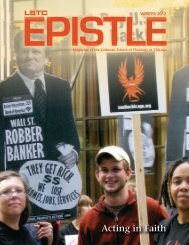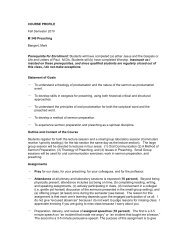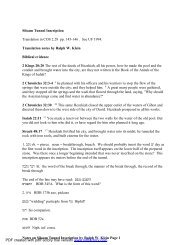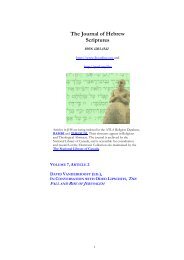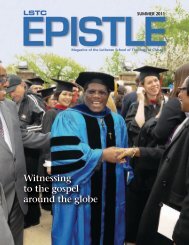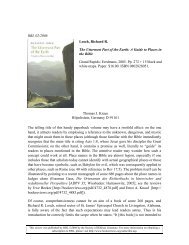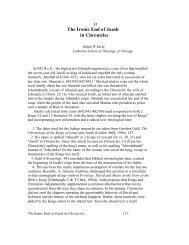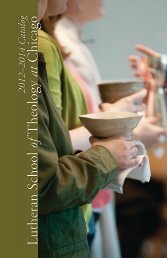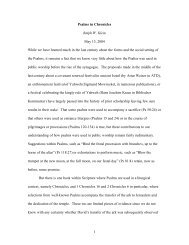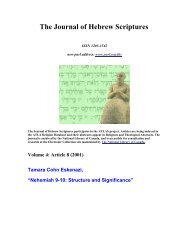Metacommentating Amos* Metacommentary, what is that ... - Fontes
Metacommentating Amos* Metacommentary, what is that ... - Fontes
Metacommentating Amos* Metacommentary, what is that ... - Fontes
Create successful ePaper yourself
Turn your PDF publications into a flip-book with our unique Google optimized e-Paper software.
h<strong>is</strong> own bread and butter?And here <strong>is</strong> my second exhibit:4. <strong>Metacommentating</strong> Amos 9The prophet brutally smashes the attraction of these banquets ofthe chosen few in society which go on long into the night, by amournful hoy [‘woe’]. He d<strong>is</strong>turbs the fastidious and dubiousatmosphere of these ceremonies where the other man’s fate <strong>is</strong>completely d<strong>is</strong>regarded . . . There are some who profit at theexpense of the community; they enjoy life while the rest weep inm<strong>is</strong>ery. Amos does not desire a prosperity founded on oppression.That <strong>is</strong> why th<strong>is</strong> fastidious set will be deported and th<strong>is</strong>refined but rotten society will van<strong>is</strong>h away. 13From whose point of view does Amos ‘brutally smash theattraction’ of these banquets? Not <strong>that</strong> of the readers, presumably,since they will not be very attracted to a party whereeveryone has long since gone home. It will be <strong>that</strong> of the partygoersthemselves; Amos thinks the national situation too seriousfor people to be enjoying themselves. And so, apparently, doesthe commentator. Without thinking, without questioning, heassumes <strong>that</strong> if Amos says it, it must be right. And <strong>what</strong> <strong>is</strong> more,it must be effective. So if Amos stands outside the window andshouts hoy, ‘woe’ (remember, he hasn’t been invited to theparty), everyone inside finds the party entirely spoiled, itsattraction smashed and its fastidious atmosphere fatallyd<strong>is</strong>turbed. Really?Amos doesn’t desire a prosperity founded on oppression, saysthe commentator, no doubt quite correctly. But he omits to mention<strong>that</strong> neither do the wealthy of Samaria, in all probability. Noone except the most depraved and cynical people walk aroundboasting about founding their prosperity on oppression. So thedifference between Amos and those he opposes <strong>is</strong> not <strong>that</strong> he <strong>is</strong>evidently in the right and they are evidently in the wrong; it <strong>is</strong> adifference in conviction about <strong>what</strong> <strong>is</strong> and <strong>is</strong> not fair dealing.Perhaps Amos <strong>is</strong> in the right, but perhaps he <strong>is</strong> not. All I am saying<strong>is</strong> <strong>that</strong> to jump to the conclusion <strong>that</strong> he <strong>is</strong> in the right <strong>is</strong> not ascholarly procedure; it <strong>is</strong> simply the reflex of an uncritical reli-13 . R. Martin-Achard, A Commentary on the Book of Amos, in R. Martin-Achard and S. Paul Re’emi, God’s People in Cr<strong>is</strong><strong>is</strong> (International TheologicalCommentary; Edinburgh: Handsel Press, 1984), pp. 48, 49.



